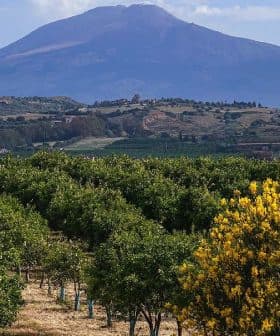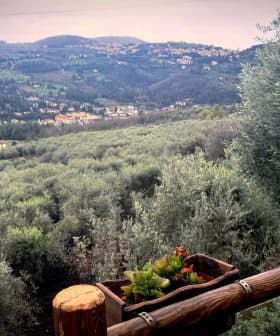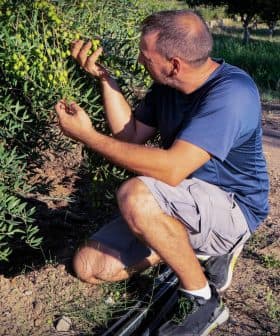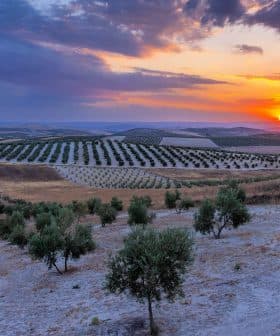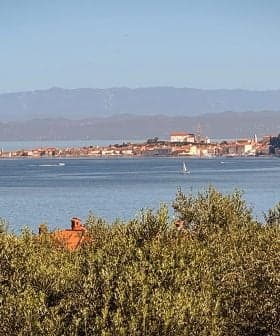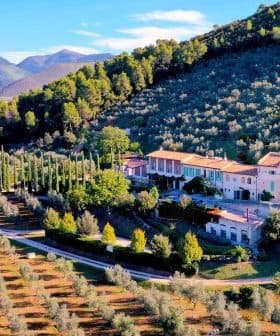Olive Oil Production in Portugal Set to Slump After Record Year
A combination of drought and many producers entering an ‘off-year’ will keep Portugal to around 100,000 tons of olive oil production in the 2022/23 season, according to the latest data.
 Quinta d’Alva farm in Trás-os-Montes (Photo: Miguel Massa)
Quinta d’Alva farm in Trás-os-Montes (Photo: Miguel Massa)  5.6K reads
5.6K readsOlive oil production in Portugal is expected to drop to 100,000 tons in the upcoming crop year, primarily due to the off-year in the olive trees’ natural cycle and ongoing drought conditions. The lack of rain has disproportionately affected traditional rainfed groves, highlighting the need for increased irrigation infrastructure and addressing challenges such as rising production costs and waste removal in the sector.
Olive oil production in Portugal is expected to fall to 100,000 tons in the 2022/23 crop year, according to Mariana Matos, the secretary-general of Casa do Azeite, a producers’ association.
“This drop is due to the fact that this is [an off-year in the olive trees’ natural alternate bearing cycle], but also to the fact that this year was particularly difficult due to drought, high temperatures at the time of blooming, in addition to other adverse conditions,” she told Olive Oil Times.
This year has been like the perfect storm… The sharp increase in production costs, as well as all the logistical and supply chain difficulties, led to an increase in the price at origin, which is affecting consumption.
Last year, Portugal produced a record-breaking amount of olive oil, with production figures ranging from 206,000 to 230,000 tons. As a result, most producers expected to see some decline this year.
Compounding the impacts of the ‘off-year’ is Portugal’s ongoing drought. The western Iberian country is on pace for its second-driest hydrological year (which runs from October to September) since records began in 1931, according to the Institute for the Sea and the Atmosphere. To date, just 419 millimeters of rain have fallen in the country, less than half of what falls in a normal year.
See Also:2022 Harvest UpdatesMiguel Massa, the chief executive of Porttable in Trás-os-Montes, told Olive Oil Times that he was anticipating a poor harvest as a result of the drought. “Production is quite reduced, and some people won’t even harvest,” he said.
However, the lack of rain has not impacted all olive growers or regions of Portugal equally. Larger high-density (intensive) and super-high-density (super-intensive) groves, virtually of which are irrigated, were significantly less affected by the drought.
The vast majority of these groves are located in the olive oil-soaked southern region of Alentejo, which Matos predicted would produce 80,000 tons of olive oil during the coming harvest.
Instead, traditional rainfed groves, which make up about 30 percent of all Portuguese olive groves, are bearing the brunt of the drought.
“The drought had a big negative impact on the rainfed olive groves,” Manuel Norte Santo, the sales manager at the Industrial and Commerce Society of Olive Oil, told Olive Oil Times. “This dry period affected the plant cycle, threatening the development of the flowering and consequent development of the fruit.”
In the northern region of Trás-os-Montes, the persistently dry weather has sparked a series of wildfires and led local officials to make irrigation a top priority for the region’s farmers.
While few olive trees have been destroyed by the fires, which have scorched more than 100,000 hectares, local mayors concluded at a joint press conference that irrigation “is crucial for the future of agriculture,” development of the economy and fight against climate change.
Matos agrees that increasing access to water resources is essential for developing the country’s olive oil sector.
“Increasing irrigation infrastructure and dams is essential in Trás-os-Montes and across the country, considering the ongoing climate change,” she said. “As can be seen in the Alqueva dam region in Alentejo, the conclusion of this infrastructure allowed a huge increase in olive oil production in Portugal, as well as other crops.”
However, Massa warned that the topography of Trás-os-Montes, with olive groves frequently located 400 meters above the nearest reservoir or supply of water, would make installing irrigation nearly impossible for small producers.
“That’s something that common producers – people who don’t have their own brand – can’t afford to do,” he said.
Portugal’s historic drought and wildfires may be the stories capturing international headlines, but both Matos and Norte Santo warned that the sector faces plenty of immediate and long-term challenges.
“This year has been like the perfect storm, affecting not only producers but industry and commerce as well,” Matos said. “The sharp increase in production costs, as well as all the logistical and supply chain difficulties, led to an increase in the price at origin, which is affecting consumption.”
Norte Santo added that prices of fertilizer and phytopharmaceutical products had increased significantly this year. Regular supply chain disruptions also led to shortages of these crucial agricultural inputs in some cases.
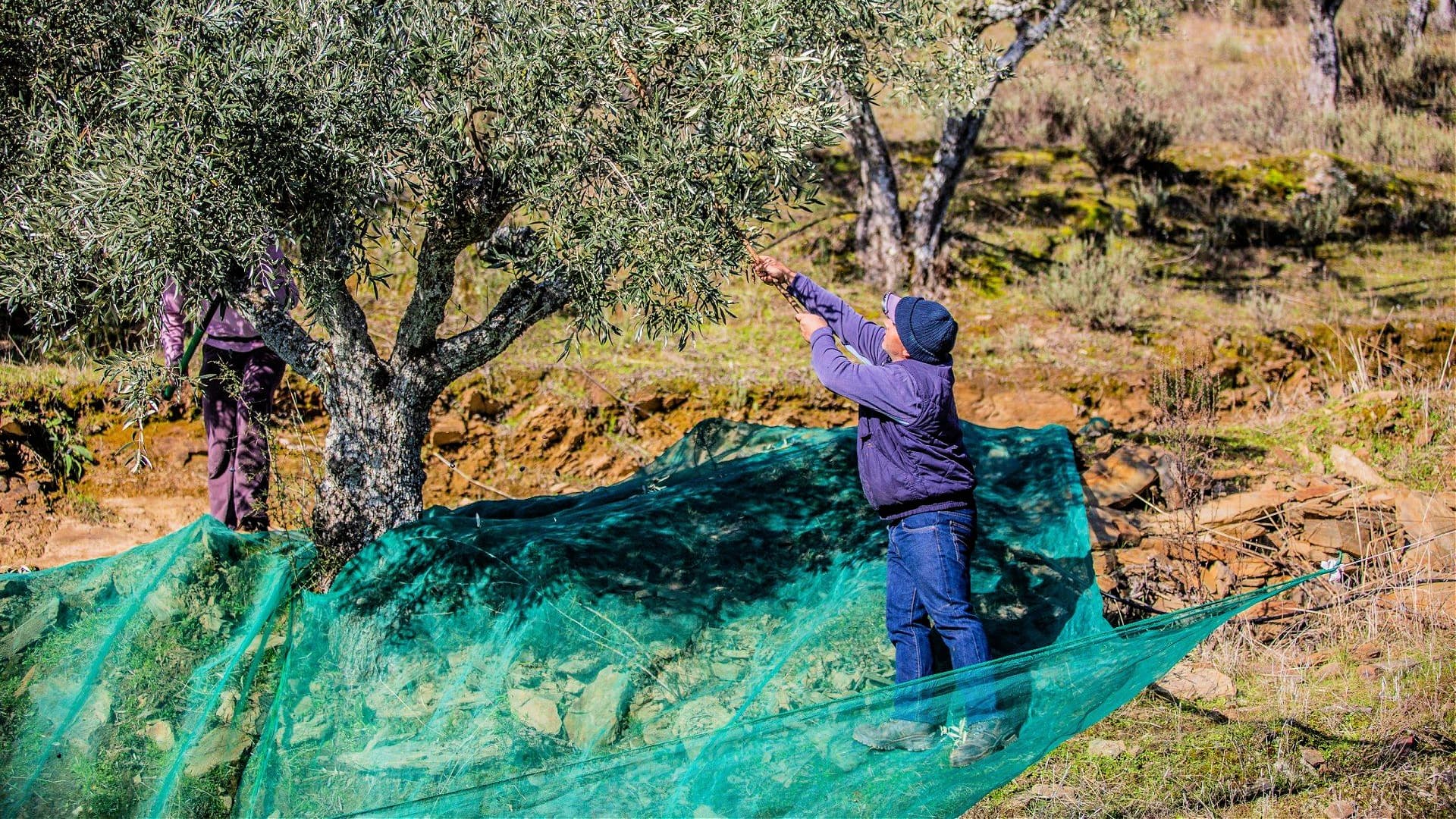
Harvesting olives in Trás-os-Montes (Photo: Miguel Massa)
On his farm, Massa said he has had trouble buying glass bottles and paid higher prices for cardboard, labels and “basically everything” as a result of inflation.
These short-term problems – fueled by the Russian invasion of Ukraine and the closure of some of the world’s largest ports due to China’s ‘Zero Covid’ policy – have exacerbated more long-term problems facing Portugal’s olive oil sector.
Norte Santo identified a lack of agricultural laborers across Portugal as one of the starkest challenges facing the entire agricultural sector. He added this change in labor demographics has partially fueled the country’s rapid transition to modern groves.
“We are seeing a restructuring of the olive groves in Portugal, where intensive and super intensive olive groves are replacing the usual traditional olive groves,” he said. “This conversion, in addition to many other factors, is also due to the fact that producers are having difficulty finding teams to guarantee their annual harvest.”
Along with finding workers to harvest the olives each autumn, Matos and Norte Santo warned that the meteoric rise of olive oil production in Portugal has not been accompanied by adequate investments in waste removal and other complementary sectors to olive oil production.
“Another huge problem that we are facing in Portugal is the difficulty in disposing of the olive pomace,” Norte Santo said. “Last year, some Portuguese mills had to close for a relevant period because they didn’t have any solution to send the pomace.”
“We have had the same extraction and treatment structure for pomace for over 10 years, but the production of olive oil is increasing every year, so the planning is not being done accordingly,” he added. “This is a serious problem.”
To solve this emerging challenge, mill operators will need to expand the capacity of existing extractors and ask for government permission to develop new ones.
“This problem became structural and will have to be resolved quickly,” Matos said. “Otherwise, we could face serious problems in the next big campaign in 2023/24.”
Once again, investing in the infrastructure to deal with production byproducts will be the toughest for traditional growers who do not benefit from the same economies of scale achieved by high-density and super-high-density producers.
“This is a big challenge that traditional olive groves will have to overcome, and the only solution is to give more value to the product that comes from this type of plantation and teach the consumer about the distinctions of this olive oil,” Norte Santo said.
“Another important challenge is to support traditional olive groves, not only for their productive role but also for its multifunctional role, for the protection of traditional varieties, for its social role and in the protection of the landscape,” Matos concluded.
Share this article


